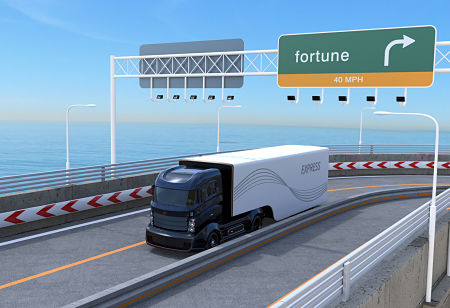Chipmaker invests in Chinese autonomous truck technology
Nvidia GPU Ventures, primarily known for its gaming system microchips, has joined a Chinese social media company in investing in TuSimple, an autonomous long-distance freight delivery company.
Formed in 2015, TuSimple develops technology for autonomous long-distance freight delivery.
TuSimple used Nvidia technology, mixed with others, to develop its autonomous driving solution. In June, the company successfully completed a 200-mile Level Four test drive from San Diego to Yuma, Arizona, using Nvidia GPUs and cameras as the primary sensors.
TuSimple has more than over 100 employees in two R&D centers, in Beijing and San Diego.
“Nvidia is unrivaled in delivering the computing performance needed for autonomous vehicles,” said Xiaodi Hou, chief technology officer of TuSimple. “By combining Nvidia technology with our expertise in computer vision and artificial intelligence, we’re building a world-class platform that will disrupt the freight industry. We highly value our strategic partnership with Nvidia.”
TuSimple’s technology ranks high in two categories by KITTI/Cityscapes, two of the leading evaluators of autonomous technology.
For KITTI, TuSimple swept three records in object detection, two in object tracking and four in road segmentation. In total, TuSimple achieved world-leading results in 10 categories.
The KITTI/CityScapes dataset has been a popular arena for many years. Its players include many world-class research institutes, such as Baidu, Samsung, NVidia, and NEC, and top universities, such as Stanford and the University of California.
The KITTI Vision Benchmark Suite, established by Karlsruhe Institute of Technology and Toyota Technological Institute at Chicago, is the world’s first and largest benchmark for vision-based autonomous driving.
KITTI includes real images collected from a variety of road scenes, from urban streets to country roads to highways. Each image contains a sophisticated scenario involving, for instance, a crowded vehicle and pedestrians, with various levels of occlusion.
KITTI object detection includes vehicle, pedestrian and bicycle detection. KITTI target tracking includes vehicle and pedestrian tracking. KITTI road segmentation includes four individual scenarios, including urban unmarked, urban marked, urban multiple marked and the average of former named urban road.
TuSimple swept KITTI’s nine individual tests, ranking first in the world for all of them, while other well-known institutes had previously had only one or two individual top ranks.
Cityscapes Dataset is published by Mercedes-Benz and provides a segmentation data set in anonymous driving. It is used to evaluate algorithms’ performance of semantic understanding in an urban setting. Cityscapes have 50 cities with different scenes, backgrounds and seasons. It has 5,000 fine annotation images, 20,000 roughly annotation images and 30 class objects.
Nvidia’s foray into the autonomous trucking technology world continues a trend that has seen the company invest in a range of tech companies. Nvidia has invested in nine companies in four countries over the past year. New investments include the following:
- ABEJA – Tokyo startup focused on AI-powered retail analytics systems
- Datalogue – New York AI data-mining platform developed out of Cornell University
- Deep Instinct – Israeli startup focused on cybersecurity
- Element AI – Montreal startup helps companies quickly integrate AI capabilities
- Fastdata.io – California startup offering streaming analytics software
- Optimus Ride – MIT spinoff developing fully autonomous vehicles
- SoundHound – Silicon Valley startup building voice-enabled AI solutions
- TempoQuest – Colorado startup doing GPU-accelerated weather forecasting
- Zebra Medical – Israeli startup using AI to read medical images
Nvidia GPU Ventures is one element of the company’s extensive involvement in the AI ecosystem. Nvidia GPU sponsors an Inception program, which supports 1,750 startups from around the world, providing access to technology, strategic expertise and the company’s global marketing platform.
TuSimple team members come from California Institute of Technology, Carnegie Mellon University, Hong Kong University of Science and Technology, Nanyang Technological University, Tsinghua University, Peking University and Shanghai Jiaotong University. Sixty percent of its employees have a Ph.D. degree.
TuSimple’s business model is comparable to Otto, a U.S.-based autonomous truck company, which provides truck companies with an autonomous driving system for highways: it primarily collaborates with auto transportation operators customizing camera and LiDAR-based low-cost autonomous driving algorithms and solutions.






